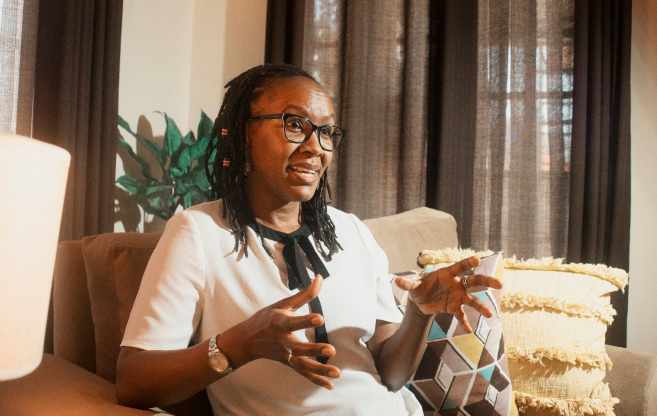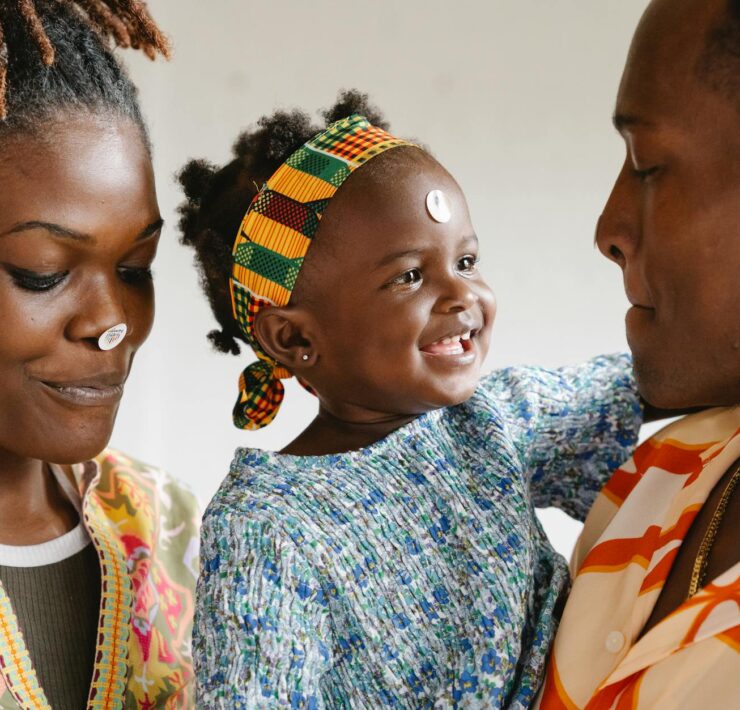
Passionate about getting God's message concerning Afrika and the end…
Read Next
Lucy, thank you so much for hosting us and thank you so much for taking the time out of your schedule to have this conversation with us.
Thank you for having me it is such a pleasure to be here on your channel.
Thank you. So, like I said Lucy is a midwife and she is founder of Eve’s Mama. Maybe you can tell them a little bit more about yourself, your background, your training and why you are now on this path.
 PIN IT
PIN ITI like to say I am a midwife because that’s what I do day-to-day. I trained in Kenya; in Kenya, we are first nurses before we are midwives, because midwifery is a specialty in nursing, so that’s my general background. After I trained, I worked in hospital for a while in both capacities, as a nurse, as a midwife, at one point I went into clinical administration. And then my own journey of having children, so that means I’m also a mother of three, is what I consider the main usher to what I do today. Because my first experience was very medical, yet I really wanted it to be natural. I’m glad it ended up being natural but I felt like I really had to fight the system to get my natural birth, which as a midwife having been trained to support women through childbirth was a bit of ‘What’s happening?’ Because I was a midwife, yes. I would support women, yes. But now I was on the receiving end, expecting the same kind of support but it was more of a tug of war for “Lie on the bed. We’ll need to give you a drip. You can’t walk around. You’re not ready to push.” It was a lot of back and forth that made me realize what women go through when they are seeking help and support that will work with their own bodies that we, honestly, as care providers are not providing.
So, I thought maybe first we need to train the midwives but then I realized not really, it’s more the mom also being able to empower herself in knowing what to expect. And that also opened my eyes to a lot of friends who had been around me who had had children before me and the struggles they probably had gone through during their own childbirth experiences but not even just childbirth but after.
I must say that I found my experiences after getting a baby quite a nice journey and a more fun journey because I kind of had a lot of information. I knew at 3 am babies don’t know that I’m supposed to be having my third dream, they wake up because they need a diaper changed and they need to feed, and I had mentally prepared for that. I knew that my body will change in more ways than one and I was ready for that. I knew that the baby would go through changes that sometimes will shock me and I was ready for that. So, I realized a lot of women struggle because they don’t know what to expect.
When I decided to leave mainstream midwifery or nursing work, I went into supporting women and I realized the only way to do it in this country is support them out of hospitals because the hospitals did not have a very concrete plan in providing the support.
What you’re saying is a very interesting point and this is something that my husband has brought up severally when we have these conversations, that childbearing and childbirth has been shifted to the place of a hospital where people are sick and or dying instead of it taking place in a natural environment where you’re actually welcoming life. How did this happen?
There are many theories as to how it happened but it initially started from a very kind angle. One of the earliest stories we have is in the first world war where, you know what happens when there’s war, sanitation is a problem, there’s no food, there’s no safety and people are dying. So, there was a thought: “Let’s rescue the pregnant women because they are holding the next generation and also they are the vulnerable of our society.” So, the pregnant women, the children and the elderly were rescued and put in this safe haven that was the hospital. Then, especially for the pregnant women, there was the thought of “When are they going to have these babies and go back to the society?” And it is said that is where the thoughts about childbirth in hospital, especially induction of labor started. And then once the war was over and people went back, there were these women who thought it was actually nice to be in a hospital and of course because the birth of the obstetricians and the midwives had now come with all that, slowly hospitals started giving care to women who were pregnant and women who were giving birth. That’s one of the earliest stories we have and it seems to be the one that features the most. Of course, there was the element of women who were really sick and they had to be hospitalized for one reason or the other, and they were due to give birth, and so they gave birth in hospital. And, slowly, hospitals started taking in pregnant women who were in their childbearing phase of life.
But we do know, historically, most women in most societies in the world, women gave birth at home. It was recognized as one of the rites of passage for the woman and there were such good vibes around it and like you’re saying it’s a natural thing. You’re not sick, so why would you be in hospital this is part of a woman’s life, so let’s have it happen in the home and celebrate it in the home.
Yes, because we are, more and more, hearing about there being regulations around it to the point where giving birth in the home is now looked upon as if it’s backward or rebellious. Either you are ignorant or poor and you can’t afford a hospital visit, or you’re just trying to be different. And it doesn’t seem to have taken a very long time for us to have moved from homebirths to hospital births and then now to demonizing people who are just trying to do it at home. Are you seeing a greater increase in people who just want to have their babies in their houses?
Yes, I can say that. I get caught up answering that question, especially in an Afrikan set-up because in most countries in Afrika, especially focusing in Kenya which is where we are at, a lot of women still give birth at home. And yes, we must credit our governments for trying to make it such that healthcare facilities are closer to the people and then the improvement of infrastructure that makes roads available and people can actually move to the hospitals quicker, but there’s still that cultural belief in the power of the woman during childbirth and there’s the element of “I really just want to have my own freedom, my own kind of way when I am doing this”, that is accompanied by the fact that “I am a woman I’d really like to have somebody else assist me and if we go to the hospitals that won’t be it because they won’t allow Chioma to come in with me or I’ll just be with the nurses who I don’t know.”
But now looking at it from a 2022 perspective, there are many women who have come full circle where natural things, not just birth, but products and hair and food is really becoming a trend. And so people are doing lots of research to find out what really is this childbirth about and how can I do this without a lot of interventions? That realization that you can actually do it, if you are well and your baby is well, you can do it safely at home, is something that a lot of people are embracing. I must say that because I have done these out of hospital births for slightly over 10 years now it’s changed the numbers are gradually increasing but there is still that “Are you really fine? What’s your problem? Why would you choose this when you have a hospital like 2 kilometers away even if it was 20 you can call a cab or drive there what is it?” There’s still that question and people look at you like you really aren’t serious with your life to choose a homebirth but honestly if you’re well, baby is well we say the safety is balanced.
What kind of interventions do people usually experience in hospitals?
Well, you know the truth is, like you rightfully said in the comment your husband made, I always say birth found itself in the wrong environment. We may not accept that but you see the hospitals are for people who are sick, being worked on so they are sent home well. Now you have a well person who has come to do another well thing and will leave well, but is caught between the speed and time and medicine and drugs that somebody needing surgery or has malaria or covid is going through. So, unfortunately, to work with the speed and time, which I think is what takes childbirth downhill, because medicine and surgery has to come in to actually help catch up with the speed that is needed for childbirth, every intervention you find tends to come because of the time element. There are, and being a health worker, I have to say that yes there are situations that really need medical attention as far as childbirth goes, but they are not as many as the ones we get caught up in because of time. It seems like “Oh, your baby is 3 days past the expected due date so let’s induce you.” “Oh, this baby is bigger than we thought let’s remove them because they’ll just become bigger tomorrow.” “This labor has taken too long; you’ve been in and out of contractions for two days let’s give you something to hasten it.” “Okay, you can’t push very well, let’s pull the baby for you or let’s cut you.” “This isn’t working let’s take you in for a c-section.” “We did a scan, there’s cord round the neck we can’t afford to have you go through labor let’s induce you or let’s do a c-section.”
There are all those little things that come in, which in all fairness are not necessary, so that’s why I keep saying yes, there are those necessary ones but if we stayed to just the very necessary without feeling limited to time and pushed by it, then we would have a lot less interventions happening even within our hospitals.
Wow, and people don’t actually know this because they trust that the obstetrician-gynecologist has made the right call and it must be urgent, but what I’m hearing you say is that there is a natural sequence to birthing that the expediency and efficiency of the hospital doesn’t always…
…accredit that. Because of time.
Natural birth is like anything else that is natural: rain, sun. It is very time unlimited. When it starts to rain, we can’t stand in two minutes and say, “Okay, stop, time’s up, now shine.” Natural birth tends to be like that so, there’s no way of telling how long it’s going to take, that’s one, but even before that, the biggest pressure is that birth outcomes are as many as we are in the world, nobody was born in the same way as the other. So, imagine we’re sitting there waiting for Lucy to unleash another new style that is the 7 million and something design? That’s a bit challenging for an institution that has policies procedures and a plan. So, it’s like we take the scripts and say, “Okay, Lucy has had three babies, so this is her fourth one. So, technically, in three hours if this baby is not out something is wrong.” So, we put her in that class. “She’s been carrying babies past her due date all the time, so it’s okay she can go past her due date, but because she can carry till 42 weeks let’s stop it at some point because if we let her, she will be 43 weeks, 44 weeks pregnant.” So, there are all these scripts that are put also because science tells us to always assume if something happens to one human being it will happen to another. So, if it wasn’t a positive thing you want to take charge and stop it, so that’s the reason why a lot of interventions keep coming in because one, we can’t control what’s happening, and secondly, all that is happening needs to be in a contained sort of structure to avoid the questions that may arise later.
So, man has really tied himself up in some knots. By contrast, what is it like in traditional Afrikan ways?
That’s a good one because it reminds me of many of my grandmother’s stories. My grandmother used to help women give birth and because I was very curious, I remember going with her once, and I think that was my first homebirth, and I was really curious about how did they do it traditionally. I was born at Kenyatta National Hospital so my mom has no story of homebirths. I’m sure even today she keeps wondering, “What exactly are you doing?” But my grandmother gave birth to her children at home, she helped women give birth at home so some of her stories were “This is normal, we just go, we boil water we make sure she’s eating, she’s moving around, she gives birth. You know, sometimes she even gives birth in the shamba (the farm), because we were in the shamba.” So, there were stories like those.
Which really led me into a path to seek a lot of information about how people give birth in Kenya, which led me to realize we are Afrikans – not that I doubted it – we really take this thing as a rite of passage and a lot of our cultures had this celebratory kind of function. It was very amazing to realize that it was a party. Someone is in labor that’s where we are all having dinner, or is it breakfast? And women would rally around, bring water, bring firewood, bring food. The men would come and sit at a corner with the man waiting for his son or daughter to be born and of course, there were the traditional midwives who initially it was a vocation, they were just women who felt the need to support other women. And just thinking about the history of midwifery, that’s probably how it started and so traditionally you’d have this mama so and so who is the one taking care of this woman, and if you look at her, her mother was the one in the previous generation, her grandmother and now she’s with her daughter teaching her daughter for the next generation and it kind of went on like that. So there were these midwives who would be the ones taking care of the women. The amazing thing about our culture was that women never gave birth alone in those olden days, they always had other women around them and secondly, you were so encouraged to keep it positive. I know I joke about it, we need to pray when someone goes into labor but it is not for “Everybody stop! Prayer requests, we are in labor! Call God.” It was not that fear factor it was for “Yeah! Lucy is in labor, she’s going to have her baby today.”
There are some cultures in Kenya that really made me happy they even called the traditional dancers of the village to come and wait there, and there was this whole dance and singing that went around when the baby came. I especially love the Luhya tribe because there was a song we sing, and I sang it as a little girl in school, that goes Mwana wa mberi and that was because it was the first child, and it backdates to those olden days where they would really celebrate and dance around and there was a fireplace and everybody rallied around. There were some places where they would blow horns and they would communicate that it’s a boy or a girl. In my actual tradition once the baby came out the women came out doing, we called them in Kikuyu aririris and there would be a number for the boys and a number for the girls and that would communicate to everybody that in Lucy’s homestead, a boy has been born.
And that really brought in a joy which unfortunately we miss today. Today it’s all for fingers crossed, legs crossed, prayer requests, fear of what will happen to me. Will I come out well? Will I be operated on? What drugs will I get? Will my baby be fine? And we’ve really lost that attachment to joy, and you know the poem you read earlier really just describes how joyous this would be. Songs, especially in the Afrikan setting, I know now it’s the world over, but songs always communicate peace and joy and enthusiasm and everything; so, this woman waiting for a song to usher in her child how will they be fearful? That’s what we’re doing one woman at a time just bringing out the joy that is childbirth.
And you’re finding that women are responding to this invitation back to joy and celebration of life?
With a lot of pressure, I would say, externally and internally, because you try tell your mom “Oh, I’ve decided to have a home birth.” And she’s thinking “What? Why? You don’t have money? We can contribute, we can look for people to give you money. What is it? Midwife? How midwives are in hospital. What’s happening?” So, there’s always that internal pressure then there’s other people who look at you like “There must be something wrong, we thought you’re weird but… you’re really pushing it. Are you your cousin in shags (the village)?” But then I know of families who are like initially it would be “Wow what a drastic change.” And I laugh about it when, especially the moms who are the soon to be grandmas, are like “You know, I was actually born at home, yeah I gave birth at hospital but I was born at home.” And we have a few grandmothers who are really happy with it, “This is normal, this is what it is. It will be okay. This is what we did.” So, we’ve come full circle and I think as we proceed we will embrace it more and more.
I think so, I think there really is a kind of restoration going on. I know in the west you really see people jumping on this whole homebirth midwifery thing and now it’s become a trend again, which now brings in more money and more issues, but there is still that purity which you are working to preserve. You’re not only interested in the moms by themselves, but you also want to bring in more midwives into your fold?
Big dream but I believe it’s achievable. I see – and it’s nice to put this out there – I see a time when we will actually have more midwives get out of the hospital and really start serving moms in their homes. Many reasons, one because I just believe it’s right and I believe if nothing is wrong with the mom or the baby, birth should just honestly be let to go the way that it does. We’ve limited the strength and capacity that women have and the power that they were created with for childbirth, so just getting to a place where we allow that to unfold and for every woman to experience that power they have for childbirth, getting that back will be really, really super. Honestly, it might sound like a joke but you get more common colds than you give birth to children so it’s better to enjoy the 2, 3, 4 experiences you will have in your life. They had better be memorable, especially because your children will be with you for a lifetime.

Have you ever tried to talk to a woman even in her 70s-80s just ask her how her childbirth experience was? You will be very surprised she will narrate it to you like it happened yesterday, why? Because we have a memory, we always remember how that experience was like. So just making it a memorable experience and allowing women especially to participate in their own body, in their own experience becomes a very powerful thing. But, even above all that, because I might sound like I am talking a lot about the woman and forgetting there is a baby in there, you can imagine if you were given a choice to be born at a hospital or to be born in your home, honestly if I was asked, I would prefer to be in my home because I think as a newborn a hospital can be a very scary place to be. First, you come out and there are all these people shouting congratulations and you’re thinking “Wait, what happened?” Then there are lights, camera, action! It’s bright, it’s loud, it’s cold. “Where is my mother? I know that heartbeat. Who is this person holding me upside down or trying to rub my back?” So, the gentleness that comes with landing is completely eliminated.
One of the things we try to do at home is just bring the gentleness for the baby and that bonding for the mom, the baby, the dad… because dads are also really eliminated in childbirth yet they are part of the family that has just been born or just enlarged. Getting midwives to recognize that side of things, which we really don’t focus on, is my dream, so that once we realize that and we start focusing on the family centered care – as opposed to just checking blood pressure and doing vaginal examinations and making sure baby’s heartrate is okay – but also just being involved in what really are these guys going through what is this season like what are the details mentally, emotionally, spiritually? What are the details in these people’s lives? It will actually make us morph into supporting childbirth in a completely different way and that realization actually helps us see that it doesn’t really need to be in a particular institution, we just need to govern the safety around it and just let it be, just lose control.
I like what you’re saying because it then actually addresses foundational issues in terms of the father and the mother, whether it is a new father or mother situation or enlarging as you’re saying, bonding with each other and creating a new environment around this child and a new environment around their home. That’s really enriching because it brings in a stabilization, a firmness a wholeness an appreciation for one another with the child. So, the husband and the wife will see each other in a new way. The child is embraced in this atmosphere, and because of that, they are able to build in a more stable fashion. Most of the births I have been told about have come from that place of fear.
It’s the intentional effort to actually make the family the heroes as opposed to the healthcare workers. So, you’re taking what is there and turning it upside down. It’s not about me and how I caught your baby, it’s about how you birthed your baby, it’s about how your husband supported you in going through this process, it’s about how your baby landed and what you guys did to receive that baby and to usher them in the world in calmness in peace. And yeah, it may sound bad and I know a lot of my colleagues usually hate me for this, but I’m like really, I’m not going to deliver a baby, because usually, that’s the term we use, “Oh I’m going to deliver a baby.” You’re not the one delivering the baby, it’s the woman delivering the baby. If anything, midwives like to say that we catch the baby because there’s a way they come out and they jump and we just catch them.
I like to say I’m going to attend a birth, or I’m going to catch a baby when I want to say it on a light note, but it’s not about me, it’s about the woman, and her baby, and her husband, and their family. What we’re doing is changing the hierarchy and putting the woman as the lead, her family next. I like what one midwife said, she said: “Midwives are like guardian angels who just stand by you to make sure that everything is alright with you.” You really never see your guardian angel but you know they are with you all the time; they stop you from hitting your toe and making mistakes of turning left and right. It’s the same thing, I am quietly there allowing this woman and her husband to enjoy this moment, and her child, if she has another child, because we don’t mind where parents don’t mind, we involve other offspring that they have had, just allowing that family to enjoy that moment. If you decide to include your other family members or friends, it’s just allowing you to go through this experience with the people you love people you feel care for you and also give other people the opportunity to care for you. Because, I will be honest, in hospital, we don’t have that time to be by your side all the time. Checkups are done every 3,4 hours. I have six of you in labor, if I give you ten minutes what’s happening to the others? I have to be somewhere seated where you’re all available to me and I see who goes first. That’s the ideal situation.
So, we don’t have that quality time to sit rub your back give you a sip of water, wipe your brow, homebirths give you that. Because I’m in your home there’s nowhere else, I will go unless you invite your sister or your friend who is also in labor so that you do it together which doesn’t’ happen. So, giving that one-on-one care is something priceless, but not imposing on what the woman will do. Just allowing her to feel her body, listen to her body, be guided in what she should do and you just encourage that and affirm it and allow her to just be.
When a child enters the world in an atmosphere of love and peace and calmness and is received by their family in that same nature, you’re not now fighting off things in order to survive in the world you’re just stable and then you focus on the next steps for the future, not this other trauma that sometimes happens where you’re just feeling like you’re rushed and now you’re a number in the system.
And there are lots of studies that have been done to demonstrate that. I don’t know about our country but I know in most western countries they have done a lot to make birth very gentle, whether natural and now they are even working really hard in making c-sections very gentle where they are trying to mimic the natural way in some of the things they do. A lot of studies have been done to show that babies who land gently, end up being very gentle even in their first month of life. They settle easily. You were received by your mom, if it wasn’t your mom, you were received by your dad, even if you were received by this midwife, they just handed you over to the rightful people, whom you already know because most babies already know the sound of their mom by the time that they are born, the sound of their dad by the time they are born. Cause it’s quite dramatic. You can imagine this baby is doing so many things for the first time, there’s drama in their life but just being in the hands of someone you know knows you, cares for you, you know them you’ve been hearing them really gives you that “I’m okay”. And even as much as yes, we do know that homebirths will not be for everyone, especially where there are medical issues to be looked at, one of the other dreams I have, except for encouraging this homebirth practice, is that our hospitals will start creating very natural and very gentle atmospheres for birth. We don’t need to have oxygen piped in the delivery room; it can come in a cylinder if we need it, but it just needs to be as gentle as possible.
I remember one psychologist describing it this way, he said “Well,” and he was telling the hospitals, “Psychology just confirms that a baby needs to come out in a similar environment as which they came in. So, if you really want to renovate your maternity wings from a psychological point of view make it as homely, as private, as quiet as non-clinical as would be… have the clinical things on the side in case you need them and bring them in when they are needed but don’t make it the center of everything.” So, that’s another dream I have that we will have delivery suites that are non-clinical.
That are human. Thank you so much for all of these insights, is there anything else that you would like the audience to know and think about as we close?
Every opportunity I have, I really like to overemphasize the strength that is within a woman to carry and birth a child, and not just that but also to nurture her child. But the lack of information that comes with that can really set you up for – should I say, failure? Because if you don’t even know that yes you have a baby growing and look it’s a lot of work creating hair, eyeballs, bones, muscles, organs, systems it’s a lot of work so it requires a lot from you, but if you don’t know “How should I eat? What should I do? How do I run my day? Should I put my legs up and just wait for this child to come out one day? Should I be active? What activity? How much of it? All that is something that we need to equip ourselves with as women and sourcing for it is really important, just so that you are not only physically okay but also mentally and emotionally okay. How do you prepare yourself to become a mother?
And sometimes it goes to both extremes you might ask somebody how is it being a mother? And somebody looks at you and says, “Oh my God it’s the best! It’s so good.” And somebody else looks at you and says “Let me tell you, just wait for your time. It’s crazy it’s like these human beings just come to consume from you.” So you can be on all extremes, but the truth is it is a balance you have good days, you have bad days, you have days you don’t even know where to place, but you have the capacity and the ability to actually navigate that course in pregnancy during birth and even after. It’s just that we need to constantly equip ourselves with the resources that are necessary. I mean take a childbirth class just know what is this labor story like. What should I do with myself? How should I take care of myself? How long will it take? Do we even know? Do we care? When the baby comes, what is required of me in terms of breastfeeding and baby care and all that? So, what do I do about this? Just equip yourself but most of all trust, it’s already within you.
That’s amazing, thank you so much. You know it’s literally a few weeks ago that I discovered that King Louis XIV of 17th Century France is the one who kicked off this woman lying on her back position during birth and then modern medicine practitioners thought, “Oh, this is really convenient and it’s a great way to help a child into the world.” But how often do we think about the origin of things? Why did women move from using a birthing stool to now lying on their backs which actually constrains their backs and their ability to contract naturally during labor therefore elongating labor and making it more painful? How often do we think about how things began and why they continue, why they are sustained? We have to be conscious of these things and ask ourselves just how much of what we call modern lifestyle even makes sense? When you do the research into the one who was called the father of gynecology and how did he come about the knowledge that he came about and you discover that actually he was operating on slave women without anesthesia and was celebrated and eventually bedeviled in equal measure. Just that we would pay attention to why we live the lives that we live so that we can make adjustments, where necessary, to reset things back to how they really should be and restore, like for instance in the example of childbirth, what would be something so beautiful and precious, to its rightful place and remove the stresses around it. Because you’re literally creating a foundation for the new life that has come into the world and you are responsible for the environment in which they come forth. So, take back the power and ask yourself these questions.
Watch the interview here:
Subscribe now for updates from Msingi Afrika Magazine!
Receive notifications about new issues, products and offers.
What's Your Reaction?
 PIN IT
PIN ITPassionate about getting God's message concerning Afrika and the end times to the world, in order to heal, restore and rebirth Afrika to her true purpose and destiny in God.





















